Items filtered by date: April 2025
Caring for an Injured Ankle
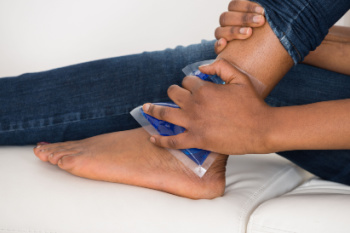
Ankle injuries, including sprains, strains, and fractures, are common and can range from mild to severe. Treatment depends on the type and extent of the injury. For minor sprains, rest, compression, and elevation can be effective. Supportive bracing and gentle stretching may follow once swelling decreases. More serious injuries may require immobilization in a boot or cast, especially if ligaments are torn or bones are fractured. Specific stretches can help to restore strength, balance, and range of motion. In rare cases, surgery may be needed to repair severe ligament damage or unstable fractures. Prompt attention and a clear treatment plan support better recovery and help prevent chronic instability or future injury. If you have ankle pain, swelling, or difficulty bearing weight after an injury, it is suggested you see a podiatrist for a diagnosis and appropriate treatment.
Ankle pain can be caused by a number of problems and may be potentially serious. If you have ankle pain, consult with the foot specialists from Certified Foot Care. Our doctors will assess your condition and provide you with quality foot and ankle treatment.
Ankle pain is any condition that causes pain in the ankle. Due to the fact that the ankle consists of tendons, muscles, bones, and ligaments, ankle pain can come from a number of different conditions.
Causes
The most common causes of ankle pain include:
- Types of arthritis (rheumatoid, osteoarthritis, and gout)
- Ankle sprains
- Broken ankles
- Achilles tendonitis
- Achilles tendon rupture
- Stress fractures
- Bursitis
- Tarsal tunnel syndrome
- Plantar fasciitis
Symptoms
Symptoms of ankle injury vary based upon the condition. Pain may include general pain and discomfort, swelling, aching, redness, bruising, burning or stabbing sensations, and/or loss of sensation.
Diagnosis
Due to the wide variety of potential causes of ankle pain, podiatrists will utilize a number of different methods to properly diagnose ankle pain. This can include asking for personal and family medical histories and of any recent injuries. Further diagnosis may include sensation tests, a physical examination, and potentially x-rays or other imaging tests.
Treatment
Just as the range of causes varies widely, so do treatments. Some more common treatments are rest, ice packs, keeping pressure off the foot, orthotics and braces, medication for inflammation and pain, and surgery.
If you have any questions, please feel free to contact our offices located in Larchmont and Brooklyn, NY . We offer the newest diagnostic and treatment technologies for all your foot care needs.
The Importance of Everyday Foot Care
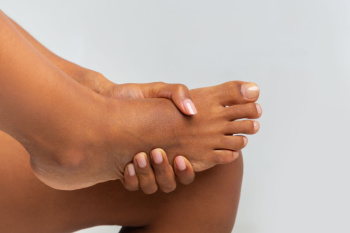
Foot health is essential, yet often neglected, and keeping your feet clean is key to preventing bacterial, fungal, and microbial infections. Feet are vulnerable to conditions like athlete’s foot, toenail fungus, and other infections due to moisture, poor hygiene, and tight shoes. Without proper care, these infections can thrive, causing itching, redness, swelling, and a strong odor. Skin may crack or blister, and toenails can thicken, discolor, or become brittle. To prevent these issues, it is important to regularly wash and thoroughly dry your feet, especially between the toes, to eliminate excess moisture where bacteria and fungi grow. Wearing clean socks and breathable shoes also helps keep your feet healthy. A podiatrist can help diagnose and treat infections with antifungal medications and offer advice on foot hygiene and prevention. If you notice any foot problems or suspect an infection, it is suggested that you make an appointment with a podiatrist to protect your feet and overall health.
Everyday foot care is very important to prevent infection and other foot ailments. If you need your feet checked, contact the foot specialists from Certified Foot Care. Our doctors can provide the care you need to keep you pain-free and on your feet.
Everyday Foot Care
Often, people take care of their bodies, face and hair more so than they do for their feet. But the feet are a very important aspect of our bodies, and one that we should pay more attention to. Without our feet, we would not be able to perform most daily tasks.
It is best to check your feet regularly to make sure there are no new bruises or cuts that you may not have noticed before. For dry feet, moisturizer can easily be a remedy and can be applied as often as necessary to the affected areas. Wearing shoes that fit well can also help you maintain good foot health, as well as making it easier to walk and do daily activities without the stress or pain of ill-fitting shoes, high heels, or even flip flops. Wearing clean socks with closed shoes is important to ensure that sweat and bacteria do not accumulate within the shoe. Clean socks help to prevent Athlete’s foot, fungi problems, bad odors, and can absorb sweat.
If you have any questions please feel free to contact our offices located in Larchmont and Brooklyn, NY . We offer the newest diagnostic and treatment technologies for all your foot and ankle needs.
The Connection Between Medical Conditions and Swollen Feet
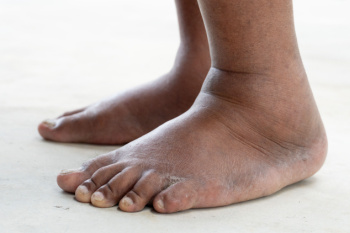
Swollen feet can be a sign of various underlying medical conditions that affect the body’s ability to manage fluid balance. During pregnancy, hormonal changes and increased pressure on blood vessels can cause fluid retention, leading to noticeable swelling in the feet and ankles. Heart conditions such as congestive heart failure may impair circulation, allowing fluid to accumulate in the lower extremities. When kidney function is reduced, the body may struggle to eliminate excess fluid and sodium, contributing to swelling. Liver disease can also lead to fluid buildup due to decreased production of proteins that regulate blood volume. Additionally, poor circulation, often from conditions like venous insufficiency, can prevent blood from flowing effectively back to the heart. If you have swollen feet, it is suggested that you visit a podiatrist who can offer you effective relief and management methods.
Swollen feet can be a sign of an underlying condition. If you have any concerns, contact the foot specialists of Certified Foot Care. Our doctors can provide the care you need to keep you pain-free and on your feet.
Swollen feet are a common ailment among pregnant women and people who stand or sit for extended periods. Aging may increase the possibility of swollen feet and patients who are obese often notice when their feet are swelling too. There may be medical reasons why swollen feet occur:
- Phlebitis - A condition that causes the veins to become inflamed and can also cause leg pain.
- Liver disease - This may lead to low blood levels of albumin which is a protein. This can cause fluid in the blood to pass into the tissues and several areas of the body can become swollen.
- Heart failure - When the heart doesn’t pump properly the blood that is normally pumped back to the heart can pool in the veins of the legs causing swollen feet.
- Kidney disease - One of the main functions of the kidneys is releasing excess fluid in the body. This type of condition can make it difficult for the kidneys to function properly, and as a result the feet may become swollen.
- Deep-vein thrombosis (DVT)- This is a serious condition where blood clots form in the veins of the legs. They can block the return of blood from the legs to the heart which may cause the feet to swell. It is important to be treated by a podiatrist if this condition is present.
Swollen feet can also be caused by bone and tendon conditions, including fractures, arthritis, and tendinitis. Additionally, there may be skin and toenail conditions and an infection may cause the feet to swell. Patients who take medicine to treat high blood pressure may be prone to getting swollen feet.
Many patients elevate their feet to help relieve the swelling and this is generally a temporary remedy. When a podiatrist is consulted the reason behind the swelling can be uncovered and subsequently treated.
If you have any questions please feel free to contact our offices located in Larchmont and Brooklyn, NY . We offer the newest diagnostic tools and technology to treat your foot and ankle needs.
Do You Suffer From Painful Feet?
Easing the Pain of Plantar Fasciitis
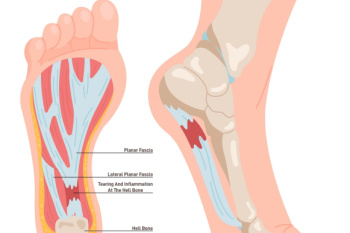
Plantar fasciitis is a well-known cause of heel pain, often felt as a sharp, stabbing sensation with the first steps in the morning or after periods of rest. The condition results from inflammation of the plantar fascia, a thick band of tissue that connects the heel to the toes. While it can be persistent, several strategies may help reduce discomfort and promote healing. Stretching exercises for the calf muscles and plantar fascia can improve flexibility and reduce strain. Wearing supportive shoes with good arch support and cushioned soles is essential for daily comfort. Custom orthotics can also help distribute pressure more evenly across the foot. Using anti-inflammatory medications may ease pain in the short term. However, if you are experiencing ongoing heel pain, it is suggested that you see a podiatrist for a proper diagnosis and appropriate treatment.
Plantar fasciitis can be very painful and inconvenient. If you are experiencing heel pain or symptoms of plantar fasciitis, contact the foot specialists from Certified Foot Care. Our doctors can provide the care you need to keep you pain-free and on your feet.
What Is Plantar Fasciitis?
Plantar fasciitis is the inflammation of the thick band of tissue that runs along the bottom of your foot, known as the plantar fascia, and causes mild to severe heel pain.
What Causes Plantar Fasciitis?
- Excessive running
- Non-supportive shoes
- Overpronation
- Repeated stretching and tearing of the plantar fascia
How Can It Be Treated?
- Conservative measures – anti-inflammatories, ice packs, stretching exercises, physical therapy, orthotic devices
- Shockwave therapy – sound waves are sent to the affected area to facilitate healing and are usually used for chronic cases of plantar fasciitis
- Surgery – usually only used as a last resort when all else fails. The plantar fascia can be surgically detached from the heel
While very treatable, plantar fasciitis is definitely not something that should be ignored. Especially in severe cases, speaking to your doctor right away is highly recommended to avoid complications and severe heel pain. Your podiatrist can work with you to provide the appropriate treatment options tailored to your condition.
If you have any questions please feel free to contact our offices located in Larchmont and Brooklyn, NY . We offer the newest diagnostic and treatment technologies for all your foot and ankle needs.
Toe-Sparing Surgery for Neuropathic Ulcers
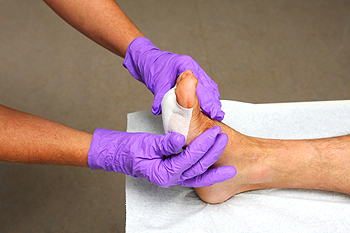
Neuropathic toe ulcers, especially those that expose a joint or bone, can be serious and challenging to treat. Traditionally, these wounds often led to partial or full toe loss. But with advances in foot surgery, there is surgery to spare toes. Toe-sparing procedures aim to remove damaged tissue while preserving as much of the toe structure as possible. By protecting the healthy parts of the toe, patients can maintain better balance and mobility, which reduces the risk of future complications. These surgeries are typically combined with wound care, infection control, and offloading strategies to promote healing and prevent recurrence. If you have a non-healing toe ulcer with exposed bone or a joint, early intervention is key. It is suggested that you schedule an appointment with a podiatrist to learn if this advanced treatment is right for you.
Wound care is an important part in dealing with diabetes. If you have diabetes and a foot wound or would like more information about wound care for diabetics, consult with the foot specialists from Certified Foot Care. Our doctors will assess your condition and provide you with quality foot and ankle treatment.
What Is Wound Care?
Wound care is the practice of taking proper care of a wound. This can range from the smallest to the largest of wounds. While everyone can benefit from proper wound care, it is much more important for diabetics. Diabetics often suffer from poor blood circulation which causes wounds to heal much slower than they would in a non-diabetic.
What Is the Importance of Wound Care?
While it may not seem apparent with small ulcers on the foot, for diabetics, any size ulcer can become infected. Diabetics often also suffer from neuropathy, or nerve loss. This means they might not even feel when they have an ulcer on their foot. If the wound becomes severely infected, amputation may be necessary. Therefore, it is of the upmost importance to properly care for any and all foot wounds.
How to Care for Wounds
The best way to care for foot wounds is to prevent them. For diabetics, this means daily inspections of the feet for any signs of abnormalities or ulcers. It is also recommended to see a podiatrist several times a year for a foot inspection. If you do have an ulcer, run the wound under water to clear dirt from the wound; then apply antibiotic ointment to the wound and cover with a bandage. Bandages should be changed daily and keeping pressure off the wound is smart. It is advised to see a podiatrist, who can keep an eye on it.
If you have any questions, please feel free to contact our offices located in Larchmont and Brooklyn, NY . We offer the newest diagnostic and treatment technologies for all your foot care needs.

